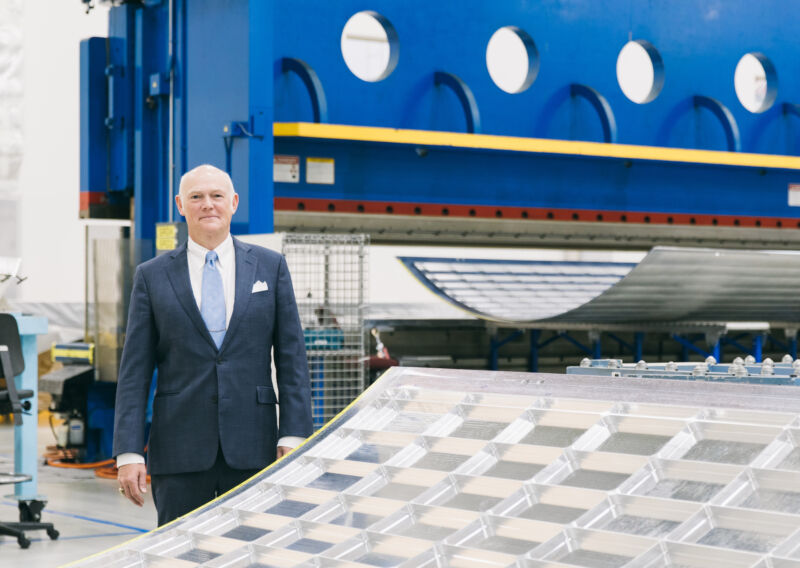
It sure sounds like United Launch Alliance is up for sale. Tory Bruno, the rocket builder’s CEO, said this week that anyone who purchased ULA would reap the rewards of the company’s “transformation” over the last few years, a course change primarily driven by geopolitics and the competitive threat of SpaceX.
While Bruno did not disclose details of any negotiations about a potential sale of ULA, he told Bloomberg News this week that the launch operator is primed for a buyer. Boeing and Lockheed Martin each have a 50 percent stake in the Colorado-based rocket company.
“If I were buying a space business, I’d go look at ULA,” Bruno said. “It’s already had all the hard work done through the transformation. You’re not buying a Victorian with bad plumbing. It’s all been done. You’re coming in at the end of the remodel, so you can focus on your future.”
If ULA has undergone a remodel, it will be tested in the next few months. On Tuesday, ULA announced the first test flight of its new Vulcan rocket is scheduled for December 24. This is the rocket ULA needs to narrow the gap with SpaceX’s launch prices. ULA’s owners started a multibillion-dollar program to develop the Vulcan rocket in 2014, billing it as a replacement for the company’s legacy Atlas and Delta rockets.
ULA has also made tentative steps to test technologies needed to reuse the Vulcan rocket’s main engines, made by Blue Origin. The Vulcan rocket will still cost more than SpaceX’s Falcon 9, but ULA says it will be less expensive than the Atlas V and Delta IV. Importantly, the Vulcan rocket will also end ULA’s reliance on Russian-built engines that fly on the Atlas V, meaning the US military will stop launching satellites using technology from an adversary.
It’s complicated
Ars first reported the possibility of a ULA sale in March. At that time, sources said the deal was expected to be closed by the end of this year. It’s unclear whether delays in the first Vulcan rocket launch, seen as a critical moment for ULA’s future, might have impacted this timeline.
Bruno’s statement was the first time ULA has seemed to confirm it is up for sale.
ULA was established in 2006 through a merger of Boeing’s Delta rocket program and Lockheed Martin’s Atlas launcher family. Since then, ULA has been a profitable enterprise for both aerospace giants, thanks to a steady diet of lucrative sole-source military launch contracts and an approximately $1 billion annual subsidy from the US Department of Defense to maintain “launch readiness.”
With SpaceX now certified to launch US military satellites, the days of sole-source contracting are over, and the Defense Department says it is committed to competition in the launch market. The Pentagon has phased out the subsidy, which it said was needed to ensure ULA’s workforce and infrastructure were available to assure access to space for military payloads.
In his comments to Bloomberg, Bruno said ULA’s ownership structure is “complicated” and has limited the company’s agility. One example of this is when ULA’s board, comprised of Boeing and Lockheed Martin executives, initially only approved funding for the Vulcan rocket in three-month increments.
While SpaceX dominates the commercial launch market, ULA remains the US military’s preferred launch provider. The Pentagon selected ULA in 2020 to launch 60 percent of its large national security space missions through 2027 and tapped SpaceX to launch 40 percent. The military is now in another multi-year launch procurement, and ULA and SpaceX again appear to have the advantage.
United Launch Alliance has also been buoyed by Amazon’s purchase of 47 launches for the Kuiper broadband constellation. These missions will carry into orbit the lion’s share of Amazon’s planned 3,236 Internet satellites to compete with SpaceX’s Starlink network.
Amazon is helping fund a big expansion in ULA launch capability to support the Kuiper constellation. Officials say this $2 billion investment will double ULA’s launch capacity, allowing it to launch as many as 25 Vulcan rockets per year.
Who’s buying?
Sources have said ULA and its corporate owners have already talked with prospective buyers. Perhaps unsurprisingly, the sources said a sticking point has been finding a buyer who will agree to pay the owners something close to the roughly $5 billion valuation they have placed on ULA.
Lockheed Martin, already a part-owner of United Launch Alliance, appears to be the leading candidate to take full control of the rocket company. Boeing is looking to recover from sustained financial losses, while Lockheed Martin is on firmer footing, forecasting more than $8.4 billion in profits for this year. Let’s not forget that Lockheed Martin developed the Atlas V rocket, the more successful of ULA’s two legacy launch vehicle families in terms of price and launch cadence.
Amazon is another possibility. Purchasing ULA would give Amazon ownership of all the critical segments of the supply chain needed to deploy the Kuiper broadband network, akin to SpaceX’s control of the Starlink constellation. Amazon is already building its own satellites for Kuiper, and if it bought ULA, it could launch them itself. This is surely an attractive proposition for Amazon that could lead to lower costs and schedule priority on the Vulcan launch manifest.
Jeff Bezos’s space company, Blue Origin, might also be in the running. Blue Origin supplies BE-4 engines for ULA’s Vulcan rocket, but is also developing its own heavy-lift rocket, the New Glenn, and has a strategic road map that differs from that of ULA, with a greater emphasis on booster reusability.
Two other ULA suppliers, Northrop Grumman and L3Harris, could also be interested. There’s also a possibility that a private equity firm could swoop in and buy the company to gain a foothold in the space industry.
https://arstechnica.com/?p=1978909

